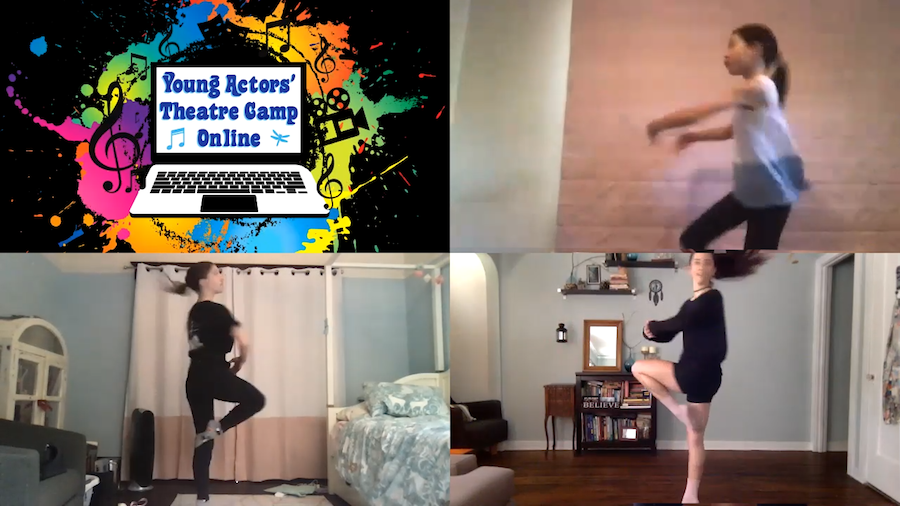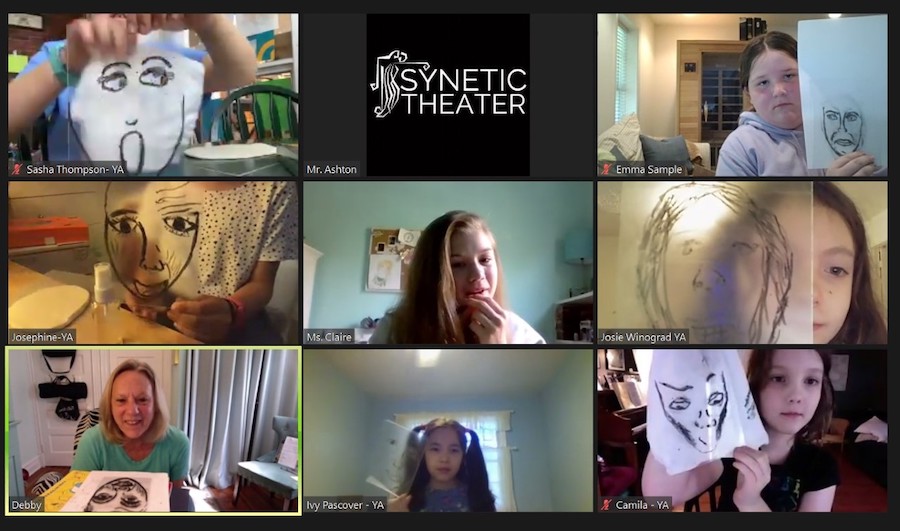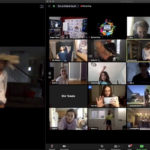Most summers, Young Actors’ Theatre Camp (YATC) begins around the campfire. But while the cabins in Ben Lomond, Calif., are empty this summer, the annual tradition of s’mores still kicked off the camp’s virtual programming. “On that first night, we were able to all go to our kitchens—some kids had fancy fire pits outside, I had a broiler—and we all did it together,” says camp director Shawn Ryan with a laugh. “Something clicked in that moment with the kids: If we set our intention, we can actualize the strategized idea.”
From coast to coast, theatre companies and overnight camps are adapting their summer offerings for Zoom because of the social distancing required by the coronavirus pandemic. According to the American Camp Association, more than 62 percent of camps are closed this summer—many of which will not be able to reopen. Horseback riding, canoeing, and games of color war and capture the flag aren’t easily transferable to Zoom, but on-camera technique classes, dance lessons, and radio plays have found a place online. Leave it to the ingenuity of theatremakers: You can have your camp s’more and eat it too.
In April, the Alliance Theatre in Atlanta held a virtual spring break camp, which served as a trial run of sorts for its summer programming. Alliance posted a series of videos about the experience to help other companies looking to pivot camp programming online. Synetic Theater, in Arlington, Va., found the series helpful for coming up with ideas. “Not doing summer camp wasn’t really an option for us, not just from a financial perspective, but also from a mission perspective,” says Synetic’s education director, Chris Rushing. TYA/USA also conducted a virtual convening in May that brought theatre organizations and educators together to share ideas and resources for teaching online summer camp. YATC’s big takeaway from an online conference was approaching the pivot with three C’s: connectivity, content, and community.
To boost connectivity, and to buoy camp spirit, many programs have mailed students “camp in a box.” YATC sent boxes of camp T-shirts, patches, craft materials, and the aforementioned s’mores kits to campers’ homes. The Alliance Theatre’s students receive bags of popcorn for movie night, props, green screens, and scripts for planned productions. The boxes at Penobscot Theatre Company in Bangor, Maine, include stick-on mustaches for costume pieces and special backdrops to use for the camp’s Zoom production of The Tempest.
“We didn’t want to create more work for our parents,” explains Ryan, noting that anything the campers needed for sessions would be included in the box.
In addition to being fun, some “camp in a box” items are designed to keep students engaged with online classes. YATC campers received emoji sticks to supplement Zoom’s “thumbs up” and “clapping” emojis to hold up during sessions, and “do not disturb” signs for their doors. One side says, “I’m on set right now, I can’t be disturbed,” while the other notes, “My dressing room is open to all of my fans!”
The boxed activities, including friendship bracelets and at-home scavenger hunt challenges, also mitigate one of the students’ and parents’ biggest concerns about Zoom camp: screen fatigue. “Right now teachers are throwing around the phrase ‘synchronous and asynchronous learning,’” says Synetic’s Chris Rushing. “There’s live engagement with students, and then we’re giving them a project they can also do on their own. Camp in a box was this perfect sweet spot for us with that.”
Zoom gloom is also being combatted with adjusted schedules, ample breaks, and appropriate camp hours for different age groups. For Penobscot, the three-day “Tiny Tales” program for tots is just 30 minutes long. YATC’s 10-hour days have breaks every hour, and long stretches for mealtimes, and some optional evening activities.
Despite these virtual efforts, some longtime campers were drained by remote learning this spring and opted out of camp this year. Alliance Theatre’s camps usually serve nearly 2,000 students, and the staffers completed an “exhaustive calling campaign” this spring to invite regular campers to the online programming. “About 40 percent decided to stay with it, which was lower than we had hoped,” says education director Chris Moses. But a bright spot was that 500 newcomers joined. “There were people that were hungry for this experience, which was surprising.”
Indeed, virtual camp has made it possible for students to participate across state lines and even oceans, and some former students who have since moved away were elated to return. “Not being hemmed in by a zip code has allowed us to reach a bunch of different states,” says Moses, noting that there are students tuning in from 25 states.
At Synetic Theater, the virtual platform has made it possible for two cousins, one located in Washington, D.C., and another in Mexico, to share a camp experience. For YATC, some students not quite ready for overnight camp happily signed up for the remote courses. And those who were, like a 13-year-old disappointed to miss her first summer in Ben Lomond, are benefiting from the one-on-one attention of Zoom classes.
The platform has also opened up ideas for entirely new performance offerings. For instance, Penobscot Theatre Company is inviting teens to participate in a radio play production of Night of the Living Dead. The show will be recorded live with students performing the foley effects. One student will even compose original music to underscore the production.
“I’m very very excited about that project,” says Layman. “It’s very cool and I think the kids will really lean into the media portion of it.” In partnership with a local radio station, multiple performances will be broadcast live, and the syndicated station will also air the show nationally.

Other creative partnerships have flourished in the Zoom world. On Wednesdays, Synetic Theater welcomes guest teaching artists from other D.C. theatre organizations, such as Shakespeare Theatre Company and the Keegan Theatre. “It’s been great that these people have the time and are willing to offer a workshop exchange,” says Rushing.
Remote camp has attracted a whole host of far-flung teaching artists and guest speakers. YATC, which usually has a starry rotation of masterclass teachers, will welcome even more celebrities this summer, including Laurie Metcalf, Jodie Sweetin, Matthew Morrison, Ethan Slater, and Eden Espinoza, among others.
Against all odds, theatre classes on Zoom can work. I observed a YATC dance master class led by Brandon Hudson, whose résumé boasts credits in Broadway’s Hamilton and Head Over Heels, at which students were engaged, asking thoughtful questions and taking notes. What’s more, they nailed the choreography. Before long, their bedrooms and backyards and family rooms disappeared to create a shared dance studio.
YATC’s Ryan assured prospective students and parents that theatre camp on Zoom is not the same as a history class on Zoom. No offense to history teachers, but theatre educators are well positioned to lead engaging and entertaining classes.
“I wasn’t sure what would transpire when we actually started doing the classes, but the response has been great,” says Layman of Penobscot Theatre. “Kids seem to really want to be involved and have something to do for the summer, so it’s heartening to know that they want to do it through Zoom.”
It seems that the initial concerns of transferring theatre classes were easier to adapt than expected. “We’re a physical theatre camp, so we have a lot of pantomime work and dance, which actually translated pretty well,” says Synetic’s Rushing.
With stage combat, singing, and improv classes in check, programs looked beyond theatre courses to offer fun ways to further connect the students. At Penobscot Theatre, themed dress-up days, such as pajamas and funky hats, fill at-home Fridays with fun. YATC’s annual haunted hike was adapted into a film by staffers and includes instructions for students to turn off their lights at certain moments. Campside storytelling is offered nightly on Zoom, and activities have included the traditional YATC Drag Race night, this year with Nina West of RuPaul’s Drag Race fame.
“There wasn’t actually anything we had to take off of our regular camp program,” says YATC’s Ryan. “It has not just worked—it has soared.”




